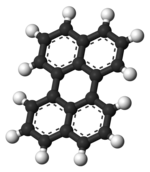Perylene
|
|
|||
 |
|||
| Names | |||
|---|---|---|---|
|
Preferred IUPAC name
Perylene
|
|||
| Other names
peri-Dinaphthalene; Perilene; Dibenz[de,kl]anthracene
|
|||
| Identifiers | |||
|
3D model (Jmol)
|
|||
| ChEBI | |||
| ChemSpider | |||
| ECHA InfoCard | 100.005.365 | ||
| KEGG | |||
|
PubChem CID
|
|||
| UNII | |||
|
|||
|
|||
| Properties | |||
| C20H12 | |||
| Molar mass | 252.32 g·mol−1 | ||
| Appearance | Brown solid | ||
| Melting point | 276 to 279 °C (529 to 534 °F; 549 to 552 K) | ||
| -166.8·10−6 cm3/mol | |||
| Hazards | |||
| S-phrases | S22 S24/25 | ||
|
Except where otherwise noted, data are given for materials in their standard state (at 25 °C [77 °F], 100 kPa).
|
|||
|
|
|||
| Infobox references | |||
Perylene or perilene is a polycyclic aromatic hydrocarbon with the chemical formula C20H12, occurring as a brown solid. It or its derivatives may be carcinogenic, and it is considered to be a hazardous pollutant. In cell membrane , perylene is used as a fluorescent lipid probe. It is the parent compound of a class of rylene dyes.
Perylene displays blue fluorescence. It is used as a blue-emitting dopant material in OLEDs, either pure or substituted. Perylene can be also used as an organic . It has an absorption maximum at 434 nm, and as with all polycyclic aromatic compounds, low water solubility (1.2 x 10−5 mmol/L). Perylene has a molar absorptivity of 38,500 M−1cm−1 at 435.7 nm.
Perylene dissolved in dichloromethane exposed to Long Wave UV radiation
Perylene dissolved in dichloromethane exposed to Short Wave UV radiation
The perylene molecule consists of two naphthalene molecules connected by a carbon-carbon bond at the 1 and 8 positions on both molecules. All of the carbon atoms in perylene are sp2 hybridized. The structure of perylene has been extensively studied by X-ray crystallography.
...
Wikipedia


